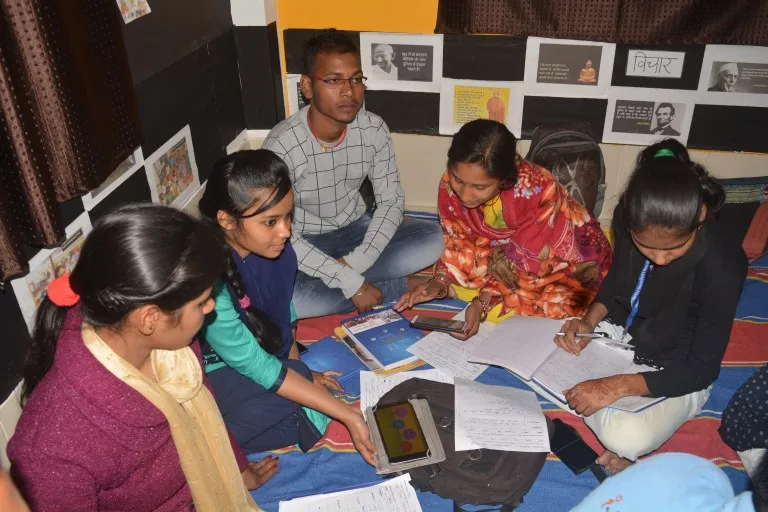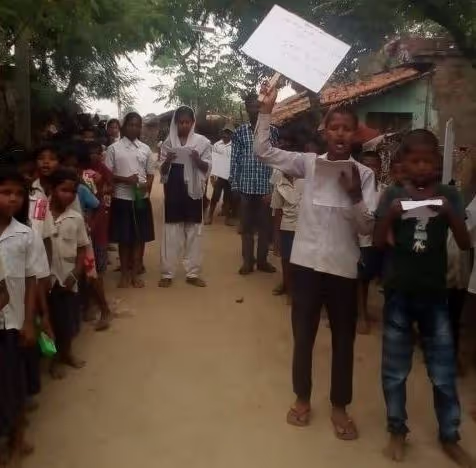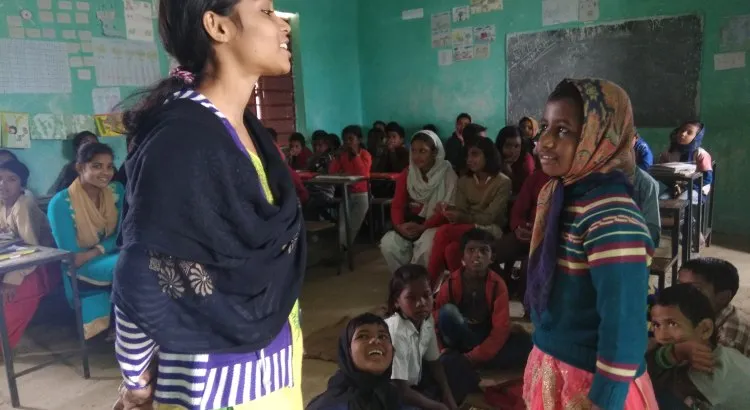

Taniya Parveen: A Journey Of Hope And Aspirations
“You need to step out to know the world outside”, says Taniya Parveen to Divya Sharma, India Fellow working in Munger district of Bihar with youth to empower them to teach in their local communities.
From Saradhi, Bangalwa village in Munger district of Bihar, where most girls are forced to stay at home and are valued with respect to their ability to do the household chores; a young girl Taniya Praveen is breaking the norms of the society by stepping out to follow her dreams.
Taniya, a 16-year old lives with her mother and four younger siblings. Her father works outside the village to earn for the family. Inquisitive by birth, she started learning Urdu at the age of two and had surprisingly read the whole Kuran by the time she was seven. Her primary education was in a private school called Saraswati School, Sahibganj, in Jharkhand, further continuing in Kramik Middle School till the beginning of her 6th standard where she showed tremendous potential in academics due to which her father got her admitted directly in 8th in Middle School Saradhi. She now teaches there.
The discovery of aspiration
Taniya, along with her primary education, was also a part of a Madarsa. She started learning Arbi as a child and was doing good there. Seeing her growth, the Maulana started assigning her to conduct revision classes for her juniors. Who knew that this will make her discover her aspiration? As an interest, she would teach in her neighborhood. Falling in love with it and being effective enough to build an understanding among children; she continued tutoring quite a few of them in her vicinity.
Connect with i-Saksham
At 15, Taniya was introduced to i-Saksham’s certification course on Basic Community Tutorship and she thought of taking a step ahead. Most of her friends quibbled on her idea of joining the program thinking that nothing can change in 3 months. Despite being uncertain about the impact, she took a chance to explore and used the time well to meet her learning requirements. As the organization was then initiating its first fellowship program, Taniya was selected for it since it would be a great chance for her to learn further about teaching and develop her skills for the next two years.
Luckily, Taniya’s father always was in favor of teaching as a profession. He feels that every other occupation is a result of teaching, and hence, didn’t need any conviction for her to go ahead with it. Stepping out from the village to learn puts Taniya in a spot where she became a topic of conversation for everyone. When I asked about her views on this, she said, "The society needs to change and understand the potential girls have, so that I and other girls can freely come and go wherever we want.’’ She has played the role of a teacher and a learner both until now in her life and will remain both throughout. The more she spends time with children to make their lives better, the more she is learning from them and believes that there is nothing better than an environment where one is surrounded by curiosity and pro-activeness. Taniya considers teaching as the best profession for herself as no outside force acts on her when she teaches. It allows her to be herself in front of children, thereby making the most of each and every session.

Taniya (second from left) leading an activity in her group during training
The new environment
As Taniya had never stepped out of her village, she found it a bit challenging to commute alone in the beginning and cope up with the training. Managing a class of 60 students was also new. She felt like giving up but the thought of doing that and sitting at home trembles her. It was too soon to quit. Things started to get better and with her hard work and team’s effort, she was now able to understand everything. "Agar hum koshish hi nahi karenge to humein pata kaise chalega ki hum kya kar sakte hain! (If we won’t try, how will we know what we can do.)”, she says.
Courage and recognition
Taniya had faith in the values of i-Saksham fellowship program. She says that she has lived some of the best moments of her life during this time. When a few students from YALE University visited i-Saksham for a week-long research, she got a chance to meet foreigners for the first time in her life. She felt proud to be able to communicate with them in basic English and stressed on how English as a language plays an important role. During our annual event, Taniya addressed the whole gathering on gender equity and importance of education for girls. Her eyes filled with pride when she saw her picture in the newspaper, the next day.
She had the courage to do what’s not considered safe. The school where she teaches is in a naxal prone area, adjoining a police camp, to ensure security. She reaches there everyday on time and teaches kids for four hours.
On asking what she feels about her students, she says “Bas main or mere bachhe ek class mein ho, aur mujhe kuch nahi chahiye” (I just want me and my children in the class and nothing else). Apart from teaching, Taniya is also continuously involved in introducing her students to several other things. She makes sure that they maintain proper hygiene, laugh often and do not suffer from any behavior complexities in the classroom.

Taniya in a rally with her students, to spread awareness on health and hygiene in her community.
The impact on children
There have been remarks of positive behavioral changes in students who come from backward areas and knew nothing about the world outside. They have immensely grown and have come to love studies using various TLMs (Teaching Learning Material) and technology. A part of the problem still exists as parents hardly care about education. They are glad if a child recites a poem in English thinking that he/she is learning but are barely concerned about sending him/her to school every day. Taniya talks to them about the importance of education and wishes to develop more people like her in the village who can stand up for their dreams and improve the circumstances. She dreams a life for them where they can independently move towards their aspirations.
How a life changed
Through the course of this fellowship, Taniya has seen several changes in herself. She is now more patient, conscious of her preconceived notions, and understands different perspectives. Her responsibility, being a 16-year old, has increased a lot as she is solely responsible for the growth of so many children in her community. She barely gets any time for household chores and is quite okay with that as she gets to spend most of her time with children. Her family has also started to understand her better and is a support system in her journey of improving the status of education in their village.
Even though Taniya aspires to be a teacher, she dreams of meeting famous personalities and discussing education as well as teaching with them. She wants to be recognized for her efforts in a way that people get a message that a girl from rural Bihar is not behind anyone. She wants to open her own school.
Role as a community leader and thoughts on empowering youth
Taniya is extremely concerned about the condition of youth in her villages, in the next few years. She is trying her best and has created an informal group of youngsters who gather on specific days and talk about what they want to do in their lives. She visualizes her village as a place where all young people can showcase their talent. It’s just a matter of opportunities available to them. While most of the girls around her drop-out of schools or don’t go to college either to sit at home or to get married, Taniya focuses on seeing the bright side where some of them are graduating in agriculture and library science while a few are preparing for competitive exams. She feels that these girls should be motivating others. She herself accepts some of the norms but doesn’t resist in finding ways to improve her own life and inspire others to do so.
The country, especially in its rural parts, needs more committed youth like Taniya who do not get hindered by the obstacles but want to turn them into constructive actions. In spite of all the challenges, she has chosen not to give up on her dreams and can be seen as an inspiration for all those who curse their circumstances for not doing well.

“You need to step out to know the world outside” – Taniya
About The Author: Divya Sharma is an India Fellow working in rural Bihar on education and youth empowerment with a non profit called iSaksham.
India Fellow applications are currently open. Know more and apply at indiafellow.org





